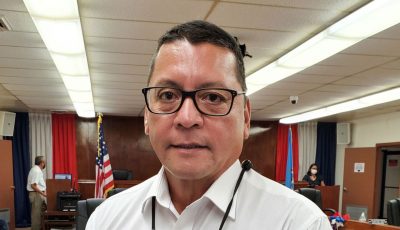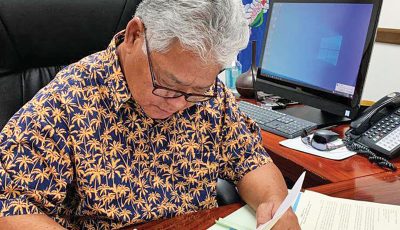AS COURT JUDGMENTS VS CNMI BALLOONS TO $27M
Dotts: Govt that don’t pay court judgments lawless
A government that will not pay court judgments against it is lawless, according to attorney Michael Dotts.
“A government that does not respect the law will lose the support of the people, and the people cannot be expected to behave any better than their government,” Dotts said.
Dotts expressed his position on unpaid court judgments in a supplemental brief filed in Superior Court as counsel for couple Timothy Cruz and Jotonia B. Aguon, and Gorjonny Camacho in two separate lawsuits against the CNMI government.
Aguon and Cruz are holding a $35,000 judgment over the death of their child during delivery in 2012 at the Commonwealth Health Center.
Camacho is holding a $10,000 judgment against the government for his medical malpractice lawsuit.
The 18th Legislature acknowledged that 17 judgments against the government totaling over $27 million have not been paid.
Superior Court Associate Judge Joseph N. Camacho last December invited the CNMI Legislature, the Office of the Governor-Office of Management and Budget, and the Department of Finance to submit briefs or declarations over the government’s failure to pay a judgment of $35,000 and $10,000 that were entered as a settlement in the two lawsuits.
Dotts said the only solution to the problem is the constitution and the court.
Dotts said the people, through their constitution, required this government to have a balanced budget.
He said a balanced budget does not ignore court0entered judgments; a balanced budget provides for their payment.
The people’s constitution, the lawyer pointed out, invested the Superior Court with the power to ensure the other branches of government complied with the mandates of the CNMI Constitution.
“This court has the authority, and the moral responsibility, to require the other branches to balance the budget and pay the judgments entered against the Commonwealth,” Dotts said.
Dotts cited that the budgets for the fiscal years of 1981 to 1983 all contained appropriations for paying judgments against the government.
After the constitutional amendment was adopted in 1985, the practice of including paying off existing judgments in a budget as an outlay continued, said Dotts, citing that for FY 1987, $16,000 and $11,000 were appropriated for two civil actions.
However, Dotts said, when the economy of the CNMI began to falter, the practice of paying judgments and other obligations ended.
Dotts contended that the 2016 budget is out of balance.
He said the Executive Branch was required to submit to the Legislature obligations, including all judgments and a schedule for their payment over the next fiscal year.
“This was not done,” said Dotts, adding such inactions have occurred for many years beginning in the late 1990’s.
The result, he said, has been an ever-growing deficit since the late 1990s, that now likely eclipses the ability of the government to address in a single fiscal year.
Dotts said had a balanced budget been implemented as required from the beginning, the problem with the NMI Retirement Fund would never have occurred.
Dotts said had balanced budgets been passed as required since 1985, when the people placed the requirement for them in their constitution, the failure to pay land compensation that has resulted in huge unpaid judgments that accrue interest would not have happened.



























